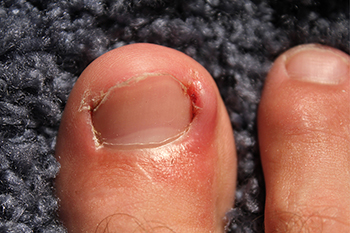
Ingrown toenails occur when the edge of a toenail grows into the surrounding skin, leading to pain, swelling, and sometimes infection. The main causes include improper nail trimming, wearing tight footwear, and trauma to the toe. To prevent ingrown toenails, it is essential to trim nails correctly. Cut toenails straight across rather than rounding the edges to avoid them growing into the skin. Additionally, keeping nails at a moderate length helps prevent pressure from shoes. The pain from ingrown toenails is due to the nail cutting into the sensitive skin, causing inflammation and sometimes infection. This pressure and irritation trigger significant discomfort, making even simple activities like walking painful. Proper nail care and wearing well-fitting shoes can reduce the risk of developing ingrown toenails and alleviate the associated pain. If you have developed an ingrown toenail, it is suggested that you consult a podiatrist who can treat this condition, which may include minor surgery.
Ingrown toenails can become painful if they are not treated properly. For more information about ingrown toenails, contact one of our providers of Gentle Touch Foot Medspa. Our staff members can provide the care you need to keep you pain-free and on your feet.
Ingrown Toenails
Ingrown toenails occur when a toenail grows sideways into the bed of the nail, causing pain, swelling, and possibly infection.
Causes
- Bacterial infections
- Improper nail cutting such as cutting it too short or not straight across
- Trauma to the toe, such as stubbing, which causes the nail to grow back irregularly
- Ill-fitting shoes that bunch the toes too close together
- Genetic predisposition
Prevention
Because ingrown toenails are not something found outside of shoe-wearing cultures, going barefoot as often as possible will decrease the likeliness of developing ingrown toenails. Wearing proper fitting shoes and using proper cutting techniques will also help decrease your risk of developing ingrown toenails.
Treatment
Ingrown toenails are a very treatable foot condition. In minor cases, soaking the affected area in salt or antibacterial soaps will not only help with the ingrown nail itself, but also help prevent any infections from occurring. In more severe cases, surgery is an option. In either case, speaking to your podiatrist about this condition will help you get a better understanding of specific treatment options that are right for you.
If you have any questions please feel free to contact our office located in Arlington, TX . We offer the newest diagnostic and treatment technologies for all your foot and ankle needs.

